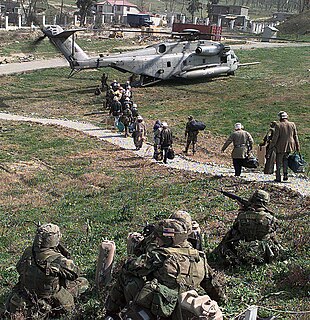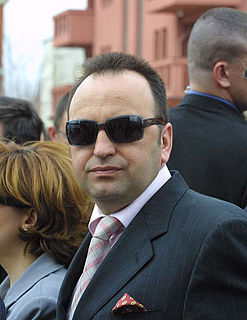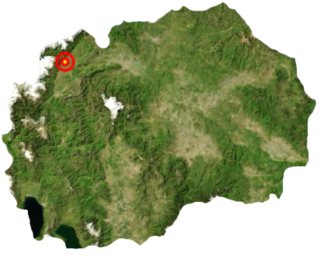Related Research Articles

The Kosovo Liberation Army was an ethnic Albanian separatist militia that sought the separation of Kosovo, the vast majority of which is inhabited by Albanians, from the Federal Republic of Yugoslavia (FRY) and Serbia during the 1990s. Albanian nationalism was a central tenet of the KLA and many in its ranks supported the creation of a Greater Albania, which would encompass all Albanians in the Balkans, stressing Albanian culture, ethnicity and nation. Throughout its existence the KLA was designated as a terrorist group by FRY.

Sali Ram Berisha is an Albanian conservative politician and former cardiologist who served as the second President of Albania from 1992 to 1997 and Prime Minister from 2005 to 2013. He is also the current chairman of the Democratic Party of Albania which has been disputed.

Ramush Haradinaj is a Kosovan politician, leader of the AAK party, and was the 3rd Prime Minister of Kosovo. He is a former officer and leader of the Kosovo Liberation Army (KLA), and previously served as Prime Minister of Kosovo between 2004 and 2005.

Nikola Gruevski is a Macedonian politician who served as Prime Minister of Macedonia from 2006 until his resignation, which was caused by the 2016 Macedonian protests, and led the VMRO-DPMNE party from 2004 to 2017.

The Albanian Civil War in 1997 was sparked by pyramid scheme failures in Albania soon after its transition to a market economy. The government was toppled and more than 2,000 people were killed. Various sources describe the violence that ensued as a rebellion, or a civil war, or a rebellion that gradually escalated into a civil war.
The Korićani Cliffs massacre was the mass murder of more than 200 Bosniak and Croat men on 21 August 1992, during the Bosnian War, at the Korićani Cliffs on Mount Vlašić in central Bosnia and Herzegovina.

Ljube Boškoski, known among his supporters as "Brother Ljube", is a Macedonian politician and former Minister of Internal Affairs of North Macedonia.
The case of the Returnees from Albania was a massive criminal trial in an Egyptian military court from February to April 1999. The trial is one of the principal sources of information about Sunni terrorist groups in the 1990s, especially al-Gama'a al-Islamiyya and its offshoot Egyptian Islamic Jihad.
In 1991, the Socialist Party of Albania, with specific social democratic ideology took control of the country through democratic elections. One year later the Democratic Party of Albania won the new elections. After 1990, Albania has been seeking a closer relationship with the West. What followed were deliberate programs of economic and democratic reform, but Albanian inexperience with capitalism led to the proliferation of pyramid schemes – which were not banned due to the corruption of the government. Chaos in late 1996 to early 1997, as a result of the collapse of these pyramid schemes, alarmed the world and prompted the influx of international peacekeeping forces. In 1995, Albania was accepted into the Council of Europe and requested membership in NATO and is a potential candidate country for accession to the European Union. The workforce of Albania has continued to emigrate to Western countries, especially Greece and Italy.

A series of war crimes were committed during the Kosovo War. The forces of the Slobodan Milošević regime committed rape, killed many Albanian civilians and expelled them during the war, alongside the widespread destruction of civilian, cultural and religious property. According to the Human Rights Watch, the vast majority of the violations from January 1998 to April 1999 were attributable to Serbian police or the Yugoslav army. Violations also included war crimes committed by the Kosovo Liberation Army, such as kidnappings and summary executions of civilians. In 2014, the Humanitarian Law Center released a list of people killed or gone missing during the war, including 8,661 Kosovo Albanian civilians, 1,797 ethnic Serbs and 447 civilians of other ethnicities such as Romani people and Bosniaks.

The 2011 Albanian opposition demonstrations were a series of anti-government protests in cities around Albania following 18 months of political conflict over alleged electoral fraud by the opposition. A video surfaced which portrayed the deputy prime minister arranging a corrupt deal with the minister of economy. The public outcry over the video resulted in the resignation of the deputy prime minister. A demonstration was called by parliamentary opposition parties, which include the Socialist Party and the Unity for Human Rights Party. These were called on 21 January in order to protest the alleged corruption of the Albanian government as well as widespread unemployment and poverty in the country.
The Smilkovci Lake killings also called the Smilkovci Lake massacre took place on 12 April 2012. Five ethnic Macedonian civilians were shot and killed at a man-made lake near the village of Smilkovci, outside the Macedonian capital Skopje.

The Orderud case was a triple murder that occurred in Norway on 22 May 1999. The victims were 47-year-old Anne Orderud Paust; her mother, 84-year-old Marie Orderud; and her father, 81-year-old Kristian Orderud, who were found shot and killed at their country estate in Sørum, Akershus.
The Batajnica mass graves, are graves that were found in 2001 near Batajnica, a suburb of Belgrade, the capital of Serbia. The graves contained 744 Kosovo Albanians, civilians, killed during the 1998-99 Kosovo War.

Saimir Tahiri is an Albanian politician, who served as the Minister of Interior Affairs in the government of Prime Minister Edi Rama from 2013 to 2017.

Operation Mountain Storm was a military operation carried out on 7 November 2007 by special police forces of the Republic of Macedonia against an armed ethnic Albanian group in the Tetovo region with ties to Albanian paramilitary of the conflicts in Kosovo (1998–1999), Preševo Valley (2000–2001) and Macedonia (2001).

Storming of the Macedonian Parliament, also known as Bloody Thursday occurred on 27 April 2017, when about 200 Macedonian nationalists stormed the Macedonian Parliament in reaction to the election of Talat Xhaferi, an ethnic Albanian, as Speaker of the Assembly of the Republic of Macedonia. It was the biggest attack on a Macedonian institution.
Roland Bartetzko is a German former soldier who fought with the Croatian Defence Council in the Bosnian War (1992–1995) and the Kosovo Liberation Army in the Kosovo War (1998–1999).

Dontae Rashawn Morris is an American murderer who shot and killed five people in Tampa between May and June 2010. He was initially sentenced to three death sentences in two cases. After a 2016 change in Florida law requiring a jury to recommend death unanimously, Morris appealed all of his death penalty verdicts. In case 2010-CF-10203A, the murder of Tampa Police officers David Curtis and Jeffrey Kocab, the jury had returned a unanimous verdict recommending death. As such, in 2021, the Florida Supreme Court affirmed his sentence of death in that case. In 2010-CF-10373, the murder of Derek Anderson, death was recommended by a majority, rather than unanimously. In 2021, Morris appealed and instead of retrying the case, State Attorney Andrew Warren elected to agree to re-sentencing Morris to life in prison on that case. Morris is also sentence to life in prison for the murder of Rodney Jones.
Thirteen Yugoslav People's Army prisoners of war were extrajudicially killed at the Korana bridge in Karlovac, Croatia on 21 September 1991, during the Croatian War of Independence. Four others survived the massacre, two of whom sustained injuries.
References
- 1 2 "Wanted Albanian Criminal Kills Five in Shootout". BalkanInsight.com. Archived from the original on March 18, 2010. Retrieved 24 September 2010.
- ↑ "Court Ruling Cutting Police Killer's Sentence Outrages Albania". Balkan Insight. 11 February 2019. Retrieved 22 March 2021.
- ↑ "Ex-Gang Member Sentenced to Life in Prison, Now Released on Probation". Exit - Explaining Albania. 17 January 2020. Retrieved 22 March 2021.